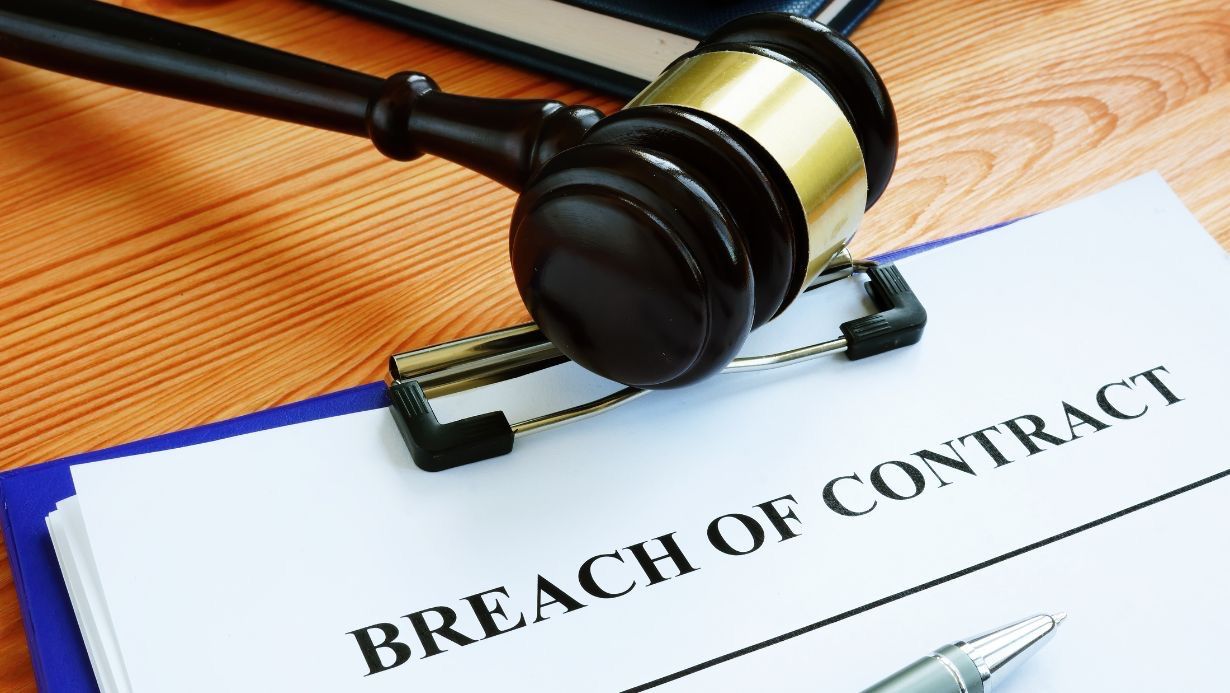Breach of Contract and Civil Litigation

A Civil Litigation Attorney can assist you with a breach of contract, which is one form of civil litigation law.
What is a Breach of Contract?
A breach of contract occurs when someone breaks the terms of a binding contract, which can be written or oral. Missed payments and failure to deliver are typical examples of a breach of contract. For example, if you sign a lease that states you are to pay $1,000 in rent on the first of each month but fail to do so, that is a breach of contract. Or, if you pay a contractor to remodel your kitchen, but they do not finish the work, that is a breach of contract.
Sometimes, the remedy for a breach of contract is written in the original contract. For example, the contract may state a $50 fee if a payment is late or there may be a default interest rate that has to be paid.
A breach of contract is not considered a crime or tort law, and unlike some civil litigation, punitive damages (extra monetary compensation) are normally not awarded. Instead, contract law aims to return the plaintiff (the person who files the lawsuit) to their economic position before the breach occurred or to provide them with the benefit of the bargain they made.
There are different types of contract breaches, such as the following:
- Minor breaches (partial breach or immaterial breach)) – One party meets most of their obligations stated in the contract but not a minor condition.
- Material breaches – One party receives significantly less benefit or results than was specified in the contract.
- Actual breaches
– One party refuses to fulfill their obligation as stated in the contract.
- Anticipatory breaches – One party announces in advance that they do not intend to fulfill their obligations as stated in the contract.
How to Resolve a Breach of Contract
Not every contract breach needs to go to court. Resolution of the breach by one-on-one discussions can sometimes resolve the matter. However, if that does not work, there may be other options:
- Mediation
– “Mediation is a private process where a neutral third person called a mediator helps the parties discuss and try to resolve the dispute,” the
American Bar Association (ABA) explains. “The parties have the opportunity to describe the issues, discuss their interests, understandings, and feelings; provide each other with information and explore ideas for the resolution of the dispute.”
- Arbitration – “Arbitration is a private process where disputing parties agree that one or several individuals can make a decision about the dispute after receiving evidence and hearing arguments,” the ABA explains. “Arbitration is different from mediation because the neutral arbitrator has the authority to make a decision about the dispute.”
Another option is to file a lawsuit in the Magisterial District Court (often known as “small claims court”) or the court of common pleas.
Defenses in a Breach of Contract Claim
A defendant (the person being sued) may sometimes have a legitimate defense.
- Repudiation – The plaintiff (the person suing) has indicated through words or actions that they do not intend to perform their obligations in the contract.
- Revocation – the defendant revoked the contract before it was accepted.
- Duress – The defendant was coerced into signing the contract.
- Modification – The defendant was following the obligations in a modified contract.
- Illegality – The terms of the contract were illegal.
- Fraud – Information in the contract was false or misleading,
- Lack of a Contract – Not all elements of the contract are proven by the plaintiff.
- Unconscionable Contract – The contract is “so severely one-sided and unfair to one of the parties that it is deemed unenforceable under the law.”
7 Tips to Avoid a Breach of Contract
Not all contract breaches are avoidable, but there are steps you can take to minimize the risk of a contract breach or give you a stronger position if there is a lawsuit:
- Check the contract for clarity and expectations before signing it.
- Be careful and selective with people or businesses that you work with.
- Document everything, including contracts, contract revisions, text messages, phone conversations, etc., regarding any binding contract.
- Pay your debts on time.
- Communicate – Good communication is the key to many disputes. Plus, the better your relationship with the person or business, the less likely a lawsuit may occur.
- Keep your word.
- Do your best to keep disputes civil.
Save Time and Money in a Breach of Contract
To achieve a successful outcome, litigation requires extensive knowledge of the law, the court system, and an often complex litigation process. Bingaman Hess’s Litigation Attorneys’ goal is to successfully resolve legal disputes as efficiently as possible. Through our negotiation skills and experience, we try to resolve disputes out of court, saving you time and money.
If you need an attorney, call the law firm of Bingaman Hess at 610.374.8377 or find us online. Our experienced litigation attorneys will review your legal issues and recommend your best strategy.










